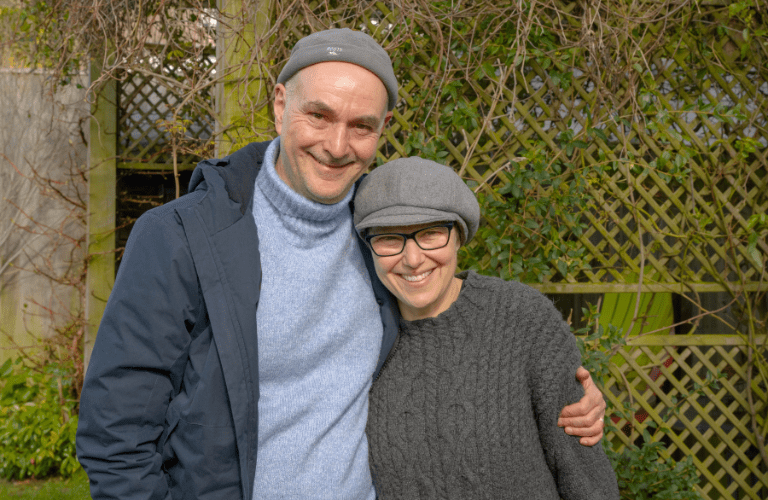
A supportive workplace meant the world after Mum’s diagnosis
When Rosie’s mum, Dawnie, was diagnosed with young onset Alzheimer’s disease, her employer ensured caring responsibilities were fully supported.

During perimenopause and menopause, it is common to experience physical and cognitive changes. These may include issues with memory and concentration, including what’s often known as ‘brain fog’, which can be similar to the symptoms of dementia.
On this page, our dementia specialist Admiral Nurses explain more about the symptoms of perimenopause and menopause, the links between menopause and dementia and how to support someone who is experiencing young onset dementia (where symptoms develop before the age of 65) and menopause at the same time.
Menopause is when menstrual periods stop due to lower hormone levels. While this is usually a natural process, other factors such as surgery, medications and medical treatments (such as chemotherapy) can cause menopause.
Perimenopause is the time leading up to menopause. Women will still have periods, although they may be different from usual (eg lighter, heavier or irregular), and many have physical and mental symptoms caused by their changing hormone levels.
Perimenopause comes to an end once someone has not had a period for 12 months. At this point, they have reached menopause.
Post-menopause is the stage beyond menopause. Some people, however, will still have menopausal symptoms and may still need medication, treatment or support.
Menopause usually occurs between the ages of 44 and 55 but can happen earlier or later. Perimenopause symptoms can begin years before menopause itself.
Perimenopause and menopause can cause a range of symptoms. Some people will experience many or severe symptoms, but others experience only mild symptoms or none at all. Their impact will vary depending on the individual.
Anyone can be forgetful or distracted at times, but during perimenopause and menopause, many people report ‘brain fog’ and say their brain feels like cotton wool. They may have difficulties with:
The difference between dementia and brain fog is that while someone with brain fog may have difficulties with memory or clear thinking, in dementia, these issues will increase over time, and additional problems will emerge, such as struggling with communication. This means the person’s abilities will decline progressively and they will need more support with everyday tasks.
In addition, while memory problems are commonly associated with dementia, they are less likely to be an early symptom of dementia in people under the age of 65. Younger people are more likely to experience changes in vision and spatial awareness, communication difficulties and changes in behaviour in the initial stages.
Because it can be difficult to tell if certain symptoms are related to perimenopause/menopause, young onset dementia or both, it is important to see a GP if you have any concerns.
There are also many other conditions that can cause dementia-like symptoms, and these should be investigated and ruled out or treated where appropriate.
Read more about the symptoms of dementia.
If you are planning to see your GP about symptoms of perimenopause, menopause or dementia, before your appointment, spend some time thinking about your symptoms, what treatments are available, and what outcomes you would like to achieve.
If you are supporting someone with these symptoms, especially if they already have a diagnosis of dementia, you can help by:
At the appointment, the doctor should discuss the stages and symptoms of menopause, lifestyle changes that may help, possible treatments and how menopause may affect your future health.
Women over 45 do not need tests to diagnose perimenopause, however, if a woman is under 45, her GP may run some tests to rule out other conditions.
If you have concerns about the possibility of dementia, or if the doctor believes that the cognitive symptoms are greater than or different from what would be expected in perimenopause, they should carry out some basic tests of memory along with other checks like blood pressure and blood tests. They may make a referral to the memory clinic for further assessment.
Be aware that some healthcare professionals are not fully aware of the range of menopause symptoms, or of the symptoms of young onset dementia. They may assume that cognitive symptoms are related to menopause and disregard the possibility of dementia, especially as it is less common in younger people, meaning a diagnosis of dementia is missed or delayed.
Alternatively, if the person already has a diagnosis of dementia, the doctor might put changes down to that, rather than menopause, meaning they don’t get the right treatment and support.
Be patient but persistent: it may take several appointments to get an accurate diagnosis and agree on a treatment plan.
The most common and effective treatment for perimenopause/menopause is hormone replacement therapy (HRT), which can be prescribed by a GP. HRT replaces or tops up the hormones that fall during this time.
It also reduces the risk of future health problems, including:
HRT should not interfere with medications for dementia, but it is important to discuss any treatments currently taken with the GP, psychiatrist or neurologist.
For the vast majority of people, the benefits of HRT far outweigh any risks, and perimenopausal or menopausal symptoms will usually improve after several months.
However, if you have any concerns about HRT for yourself or someone you support, be sure to discuss these with your GP or a menopause specialist who can help you weigh up the pros and cons.
There are different types and doses of HRT, and different ways of taking it.
This is the main hormone in HRT and is usually taken through the skin via a patch or gel. It also comes in tablet form, but this may increase the risk of blood clots.
Women who still have a womb will need to take progesterone to keep the womb lining thin and healthy. The safest types of progesterone are Utrogestan, which comes in capsule form, or the Mirena coil: a small plastic T-shaped device that is inserted into the womb.
Taking a testosterone replacement alongside oestrogen and progesterone may help improve energy levels, sex drive, bone and muscle strength, brain fog and sleep. It comes as a cream or gel.
However, many GPs do not prescribe testosterone so you may want to seek advice from a menopause specialist.
Vaginal oestrogen is used to improve symptoms like vaginal dryness and soreness, frequent urination, urine leakage, thrush and UTIs.
There are lots of other things that may help manage menopausal symptoms, whether or not you choose to take HRT. These include:
If you are supporting someone with young onset dementia who is going through perimenopause and menopause, you can help them by:
It has been shown that women are more likely to develop Alzheimer’s disease after menopause. Research suggests that this is possibly due to the protective effects of oestrogen on the brain falling after menopause; however, this still needs further investigation.
To speak to a dementia specialist Admiral Nurse about young onset dementia, perimenopause or menopause or any other aspect of dementia, please call our free Dementia Helpline on 0800 888 6678 (Monday-Friday 9am-9pm, Saturday and Sunday 9am-5pm, every day except 25th December) or email helpline@dementiauk.org.
If you prefer, you can pre-book a phone or video appointment at a time to suit you.

When Rosie’s mum, Dawnie, was diagnosed with young onset Alzheimer’s disease, her employer ensured caring responsibilities were fully supported.

Jude was diagnosed with young onset Alzheimer’s disease in 2021 aged 57. She lives in Oxford and is married to Becky. They have two daughters, aged 17 and 19.

Johnty’s best friend Jude was diagnosed with young onset Alzheimer’s disease in 2021, at the age of 57. Here he reflects on Jude’s diagnosis and the impact it has had on their lives.
Brain fog is a very common symptom of perimenopause and menopause, with many people saying their brain ‘feels like cotton wool’. It can cause forgetfulness and memory issues. However, people with dementia are also likely to experience difficulties with communication and understanding and changes in personality and behaviour. These changes will get worse over time.
Because it can be difficult to tell if symptoms are related to perimenopause/menopause, young onset dementia or both, it is important to see a GP if you have any concerns.
Before your GP appointment, spend some time thinking about the symptoms you are experiencing, possible treatments are available, and what outcomes you would like to achieve. Your GP should support you to come to your own decision about your treatment plan, as long as you can show that you understand the relevant information and the pros and cons of any particular treatment.
If you do not agree with the GP’s recommendations, you may wish to ask another healthcare professional (who could be a GP in the same practice) for a second opinion.